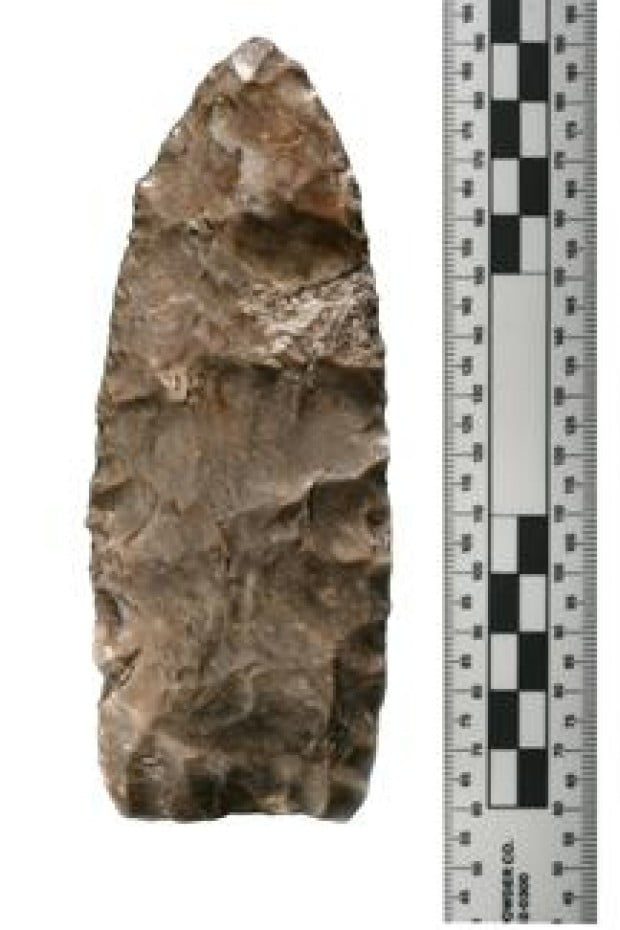
The “Farpoint” archeological site in Malibu will, however,
be listed on the state’s registry of historic places.
By Melonie Magruder / Special to The Malibu Times
The California State Historical Resources Commission voted on Aug. 3 to recommend to the National Register of Historic Places that the Malibu Point Dume site where an ancient spear point was discovered be accepted on the register. However, the site’s owner has opposed the listing, which effectively kills the possibility of it being listed. The owner’s opposition does not inhibit the listing of the site on the state’s Register of Historic Places.
As reported in The Malibu Times early last year, the site, called “Farpoint,” discovered by archeologist Gary Stickel, could potentially redefine the accepted history of human settlement in the Americas. Stickel was the archeologist of record in the excavation of the property prior to development, as required by state law for any properties that are deemed archeologically sensitive.
While uncovering, as expected, a great deal of Chumash artifacts, Stickel also found an 8-inch long spear point that turned out not to be a tool produced by the Chumash people, who settled along the California coast centuries ago, but something produced by the Clovis people even earlier.
Until the spear point find in Malibu, no artifacts by Clovis people had been found farther West than Clovis, New Mexico and even those were at least 2,000 years younger than the Malibu, or Farpoint, find.
“The discovery of a Clovis spear point this far west could change our understanding of the settling of North America by ancient peoples,” Stickel said. “Instead of hunting parties traveling over the Siberian land ridge after the last Ice Age and settling here 14,000 years ago, this spear point might prove that early Europeans arrived on America’s East Coast and traveled over the whole continent to arrive here 17,000 years ago.”
The dispute arose when Stickel lobbied for further archeological research of the site and the landowner, who had already spent several thousand dollars herself on excavation, put her foot down, declaring that she had fulfilled her historical obligations and was ready to build her house on the site.
The Chumash artifacts and the spear point were turned over to local museums and the landowner, who remains unidentified to preserve her privacy and the integrity of her home site from trespassing, started pouring cement for her driveway.
Stickel’s efforts to delay further development of the site led him to consultation with a number of paleontologists and experts in radio carbon dating from around the world.
Dennis Stanford, from the Paleoindian Program at the Smithsonian National Museum of Natural History, said, “I am disturbed to hear that this site of potentially history making significance is not being preserved. No ‘in-situ’ Clovis age sites are known along the West Coast of the Americas.”
“In-situ” indicates that an artifact was buried at the site with its original peoples, rather than carried there by later civilizations. Stickel confirms that this is the case with the Farpoint spear point.
“Unfortunately, the land owner already sent a letter to the state Historical Resources Commission opposing the nomination of her land to the National Historic Registry,” Stickel said. “That opposition is enough to keep the site off the National Register, and therefore, protected from further destruction.”
Jerry B. Howard, curator of anthropology at the Mesa Southwest Museum in Arizona, wrote in a letter to the Malibu City Council, “The find at this site raises the possibility of discovering an entire assemblage of related material representing a [Clovis] occupation site. The number of such sites ever found from this time can probably be counted on one hand.”
When The Malibu Times consulted the landowner in March, she indicated that she wanted to suspend further excavation due to “liability” concerns and even suggested that Stickel had planted the spear point at the site himself.
“You can buy Clovis spear points on Ebay,” she said at the time.
Stickel maintains that the spear point is authentic because it was found undisturbed, confirmed by witnesses, below field levels of Chumash occupation. “Carbon dating of the spear point and the level at which it was discovered place it there 11,000 years ago,” Stickel said. “This is science.”
While the adoption of the Farpoint site to the National Register of Historic Places might not be confirmed, the very fact that the SHRC voted to recommend it means that the site will be included on the state of California’s Register of Historic Places, Stickel said.
When contacted this week by The Malibu Times about the historical site designation, the landowner said, “I have no comment at all.”
“This is our national heritage,” Stickel said. “I don’t want to stop the landowner from living on her property. I don’t even insist that it be excavated now. I just want her to preserve the site from further development and destruction.”